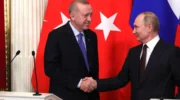Ukraine’s struggle for younger, able-bodied fighters is reverberating around the old continent. Governments must plan, not panic.
“The French are all soldiers and must defend their homeland.” So decreed the 18th-century law that made military service mandatory in France, until the end of the Cold War banished it to the history books and replaced it with a kind of glorified recruitment day — which I dutifully attended as a teenager and promptly forgot about. Nobody under the age of 45 in France has forcibly worn army fatigues or picked up a weapon, including Emmanuel Macron.
Yet the return of war to Europe’s doorstep means France is one of several countries anxiously watching the Ukrainian frontline and debating whether it’s time to bring back the old ways of conscription or mandatory military service. But what’s needed now is planning rather than panic.
For those geographically closest to Russia, this is obviously less of a debate. Ukraine this week lowered its conscription age to 25, from 27, as it struggles to replenish the ranks of its army with the able-bodied young. Denmark has extended conscription to women and increased its duration, and Norway is following suit. New NATO member Sweden brought it back in 2018.
Further West, things get muddier: The UK is debating a “citizen army” instead of more unpopular conscription schemes, while in France, Macron is promoting “civic rearmament” with a focus on improving national unity. Germany, which faces the huge challenge of steering away from decades of pacifism, is mulling a return to conscription after ditching it in 2011.
The pressures forcing governments to break an often taboo subject are understandable. What NATO officials call “expecting the unexpected” has forced countries to start looking at their ability to fight in a more dangerous world. Two interlocking worries keep coming back: One is demographic, on an Old Continent where the median age is around 42 and birth rates are in decline. Demography may not be destiny, but in high-intensity warfare it counts for a lot. Ukraine has been left with no alternative but to draft more 20-somethings, a smaller and more prized segment of its population, after worrying signals that the average age of its army was rising past 40.
The other challenge is voluntary recruitment into armies that have for years has been forced to do more with less. Militaries are struggling to recruit young people into a career that seems full of constraints and restrictions and light on perks and incentives — think secrecy, no social media, time away from home. The UK army has failed to meet its recruitment targets at all training centers for the past five years; France also missed its targets last year by around 2,000.
The result isn’t pretty. Jean-Dominique Merchet, author of Are We Ready For War?, says that the French army’s current capacity could hold a frontline no longer than 80 kilometers (50 miles) — compared to a Ukrainian front that’s about 1,000 kilometers long. Edward Luttwak, writing in the Telegraph, said that Europe’s political and cultural realities mean that if troops had to be sent to Russia tomorrow, only very small special units would be willing and able. Hence, why governments are getting less squeamish about making it all less optional.
But although the debate is worth having, European countries should recognize that jumping back into a conscription mindset has limits. Even in Ukraine, where pressure is greatest, hundreds of thousands of men of fighting age are said to have fled the country to avoid the draft. Rather than the typical accusations about today’s youngsters being weak and coddled, polls show that the under-40s who would refuse to fight in a country like the UK may be disillusioned by years of unjust wars.
Instead of assuming that all voluntary enrollment options have been exhausted, we could be more creative. Polls do show support for the armed forces in general. There’s still scope to do more to promote new roles within defense, such as in artificial intelligence and cyberwarfare, in a world where threats to national security exist in the digital cloud and in vital under-sea infrastructure like undersea cables. New hires from the private sector — France’s new military AI initiative is headed by a former Alphabet Inc. expert — would also have the advantage of bringing in fresh ideas as well as new talent.
And where voluntary labor-market incentives fail for full-time military careers, civic duty could be rekindled with military service that aims to train reserves of part-time volunteers. France is investing in the reservist model to make up for gaps in its military ranks, aiming to double reservists to 80,000 by 2030 and expanding the age limits.
The message from Ukraine is that defense readiness is a necessity rather than a luxury in Europe. But the fight for hearts and minds still needs work.









